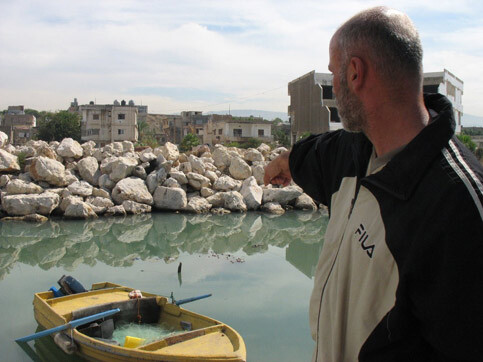IRIN 19 October 2006

Fisherman Wissam Arab points at the fish net emerging from his sinking boat in Ouzai Harbour. (Marie Claire Feghali/IRIN)
BEIRUT - Wissam Arab pointed sadly at shredded nets and broken pieces of wood in the dirty water in Beirut’s Ouzai Harbour. It is all that remains of his work over the past 11 years.
Arab’s fishing boat was destroyed in the July-August conflict between Hezbollah and Israel. It lies 15 metres deep in the Mediterranean Sea, now polluted after an Israeli air strike on a nearby power plant created a massive oil spill. His livelihood is in tatters, he said.
“The sea was my friend. Now, even divers are scared of going under the water to check on my boat. It was drowned by one of the rockets that hit the harbour,” Arab told IRIN. He fled the suburbs a week after the start of the war on 12 June and took shelter with his wife and two children in a public school in the eastern suburbs of the capital.
He survives on borrowed money and used a US $3,000 donation from the United Arab Emirates to pay off debts he had from his boat.
The United Nations Development Programme (UNDP) said in August that the Ouzai Harbour was “the most polluted and damaged harbour in Lebanon, after nearly 320 boats were destroyed and sank after Israeli air raids on the harbour, fish market and cafeteria”.
An estimated 12,000 fishermen were directly affected by the conflict in Lebanon.
Adel Zeineddine, spokesman for the Fisherman’s Cooperation in Beirut, told IRIN that more than 336 fishing boats were destroyed in Ouzai Harbour, located in the capital’s southern suburbs. With up to five fisherman per boat, Zeineddine estimates that some 1,000 families lost their income after the harbour was destroyed.
“Every day since the cease fire, the fisherman come to inspect their boats. Some of them spend hours looking at the sea, they have no nets, no boats - nothing. This place has become an open wet cemetery, with floating shredded fishnets,” said Zeineddine.
Dr Mona Hammam, UNDP representative in Lebanon, on Wednesday toured the heavily polluted harbour with Hezbollah lawmaker Amin Sherry and Issam Kataya, president of the fishermen’s syndicate in Beirut harbours. Tens of fishermen waited anxiously.
“It’s not the money we need, Madame, it’s the boats and the nets,” said fisherman Bilal Baghdady. “We were all in debt when the war occurred, and when you give us money we use it to pay those debts. Our conditions worsen by the day, and we are about to lose the fishing season. How will our families survive?”
Hammam stressed the need to help Beirut fishermen by providing them with the equipment they required. “It’s important to help them rebuild their lives, because they are an asset to the economical and industrial cycle in this area. We already helped with cleaning the harbour and seaside in Ouzai from the rubble and the wreckage, but now it’s time they had some boats,” she said.
The cleaning process, funded by Canada, cost some $78,000. UNDP announced in August that it would donate $100,00 from its budget to improve the damaged fishing industry, and rebuild the Ouzai Harbour.
Kataya said pollution was still a major problem and it would take a year for normal life to resume. “But the aim is not to give men a fish for a single meal. They must be able to eat for the rest of their lives,” he said.
Hezbollah lawmaker Amin Sherry told IRIN his party had been paying the fishermen some compensation to help them survive. “These people live below the poverty line, they have been in this situation their entire life, and the war has only made their conditions worse. For Eid [celebration marking the end of the Muslim holy month of Ramadan], we are giving every one of them $250.”
Some of the fishermen were happy with the news. “We are not all supporters of Hezbollah,” said Zeineddine, “some of us are Christians, others Sunni and even Druze, but Hezbollah is doing a good job supporting us.”
This item comes to you via IRIN, a UN humanitarian news and information service, but may not necessarily reflect the views of the United Nations or its agencies. All IRIN material may be reposted or reprinted free-of-charge; refer to the copyright page for conditions of use. IRIN is a project of the UN Office for the Coordination of Humanitarian Affairs.
Related Links